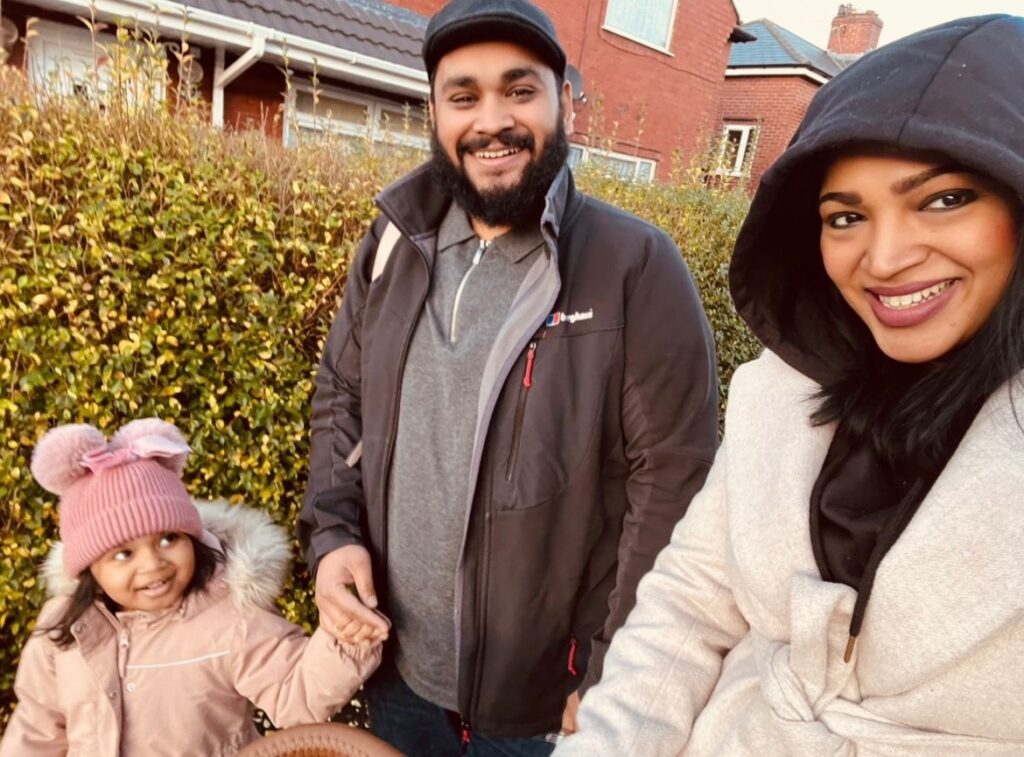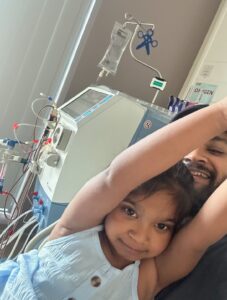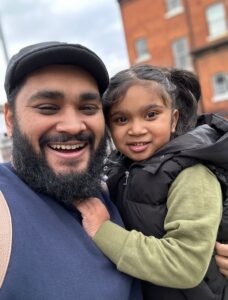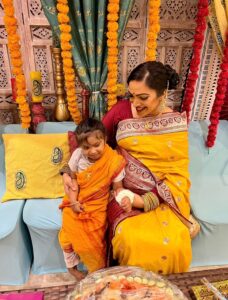A father, who donated a kidney to his four-year-old daughter, is sharing his story in the hope others will ignore misinformation and stigma within religion and donate their blood and organs to save others.

Azizur Rahman, 34 and from Manchester, underwent a renal transplant procedure at Manchester Royal Infirmary, one of the hospitals run by Manchester University NHS Foundation Trust – the trust who also run Wythenshawe Hospital’s specialist Heart and Lung Transplant Centre.
 He knew his daughter Diyanah would one day need a kidney, she had been born with kidney failure which meant she was fed through a tube and required 24/7 care. To look after Diyanah and ensure his wife could continue her training to be a solicitor, Azizur paused his own legal training:
He knew his daughter Diyanah would one day need a kidney, she had been born with kidney failure which meant she was fed through a tube and required 24/7 care. To look after Diyanah and ensure his wife could continue her training to be a solicitor, Azizur paused his own legal training:
“Diyanah was in and out of hospital a lot, she was on haemodialysis which meant she had a central venous catheter inserted into her chest. If she ever had a temperature we would need to go straight to A&E, which happened numerous times and the admission could be for a few days. It was about when she would need a kidney, not if.
“Because of that, my mum said she would donate first as it would allow me to donate later down the line when Diyanah inevitably needed a second transplant. But it became apparent my mother would not be medically fit to donate and it would be down to me.”
Before Azizur could donate his kidney, he needed to get his weight down from 120kg to 95kg, something he managed after a lot of work with the hospital and a strict health and diet regime:
 “As a father, you would do anything for your children, but I didn’t want to think about the procedure at all – I knew I had to do it but I found the image of me being cut open and an organ removed difficult.
“As a father, you would do anything for your children, but I didn’t want to think about the procedure at all – I knew I had to do it but I found the image of me being cut open and an organ removed difficult.
“My main motivation was Diyanah. She’s had several procedures over the years, with the most major surgery being the removal of part of her lung. She bounced back every time and I always told myself if a child like Diyanah could go through so much and be as happy and bubbly as she is then so could I.
“The team at Manchester Royal Infirmary were amazing and the operation went really well, we have a real relationship with staff at the hospital. The doctors, nurses and support staff at Royal Manchester Children’s Hospital have also become an extension of our family, we are ever so grateful to them.
“It has all been a bit of a wake-up call for me too, now I’ve lost the weight and improved my lifestyle I want to stay this way. The first few weeks after the transplant were difficult, I’d be tired walking to end of street – what was a five-minute walk was taking me nearly 30 minutes.
“Diyanah is now 90-95% better, the sensation of having different kidney is strange to her. The amount of time spent in and out of hospital has had a severe impact on our social life and there’s lots we want to do now, I’ve never been able to take Diyanah swimming and can’t wait to take her for the first time.
“She’s also just started school, so this transplant couldn’t have taken place at a better time. She can be more herself and hopefully live a normal enough life without being unwell and being admitted into hospital all the time.”
As a religious man, one of the challenges Azizur encountered when facing the prospect of needing to donate was a stigma to donating blood or organs from some of his religious peers – something people of all religions can sometimes face.
Educating people on the reality of what his religion does and doesn’t allow is something Azizur is now very passionate about:
 “Being a Muslim, as a child you’re told in passing by your elders that we don’t do this sort of thing, so that was my norm. The line most people stick by is that we must look after our own bodies as they are given to us by God and we don’t have a right to take it apart. I remember when recent changes were made on opting out or in for organ donation, friends and family would message to make sure we opted out.
“Being a Muslim, as a child you’re told in passing by your elders that we don’t do this sort of thing, so that was my norm. The line most people stick by is that we must look after our own bodies as they are given to us by God and we don’t have a right to take it apart. I remember when recent changes were made on opting out or in for organ donation, friends and family would message to make sure we opted out.
“Once people knew I was planning to donate to Diyanah, they would ask me about it and say ‘are you sure’, ‘you do know you’re not allowed to donate your organ’ – even my dad said maybe we should wait. I always said it’s my daughter, she needs it and I want her to have the best chance at life, to attend school and not always be at the hospital.
“I did my own research into what my religion would allow and it’s funny, it’s the exact opposite of those misconceptions. The Quran says: ‘If anyone saves a life, it is as if he saves the lives of all humankind’ and ultimately donating an organ is doing just that.
“Furthermore, there have been a number of Fatwas (religious edicts) issued over the years in relation to organ donation which permit organ donation both living and when deceased. The conditions are that it cannot be for profit or gain, it cannot be detrimental to one’s own health which is all in line with NHS procedures regarding donation.
“I’d tell those who asked if I was sure about donating and they’d say ‘oh, I didn’t know that’. We’d all been taught since we were young but never looked ourselves, until you have a reason to research it you wouldn’t find out. Regardless of faith I would have done it as it’s my daughter, but it was comforting to know my faith does actually allow me to.
“Thousands are waiting for an organ and when it comes to people of South Asian background, there aren’t many who will voluntarily give up an organ – which I think comes down to religion and misinformation.
“If someone has the opportunity to make a difference to a person’s life they should, it’s important people make wishes clear to their family on what they would like to do upon their death – it would make a massive difference to multiple lives. It is allowed within our religion, there’s no reason not to.
“People of South Asian background on waiting list will find it more difficult as you want an organ that is the best match possible, they shouldn’t miss out because less people of similar backgrounds donate. If you needed an organ you’d want one, so shouldn’t we really be giving one where we can?”